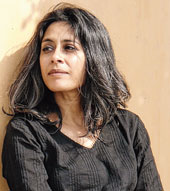Anuradha Roy won the 2011 The Economist Crossword Book Award for Fiction for her second novel The Folded Earth, which revolves around Maya, a woman who builds a new life in Ranikhet to escape a personal tragedy. When corrupt politicians threaten to destroy the lives of the hill community that she’s grown fond of, Maya is caught between the life she’s trying to put behind her and the new home she wants to protect.
 |
Anuradha’s debut novel An Atlas of Impossible Longing was also shortlisted for the Vodafone Crossword Book Award. An editor and co-founder of the publishing house Permanent Black, she spent a lot of her growing-up years in Calcutta and studied at Presidency College and later New Hall, Cambridge. She is now based in Ranikhet.
Writer, editor, journalist — which hat do you find more satisfactory?
I think of myself as cover designer and dogwalker. I feel something of an imposter in most other roles.
The Economist Crossword Award wasn’t the only award The Folded Earth was nominated for… what matters more, numbers, reviews or awards?
The Canadian short story writer Alice Munro said somewhere that bad reviews made her unhappy because you would rather be applauded than booed off stage. Awards and reviews and sales figures are all different kinds of affirmation for a book and most writers want the lot.
Why did you not decide to publish your books under the Permanent Black banner?
Well, firstly, Permanent Black doesn’t publish fiction. Plus, there would have been a whiff of vanity if we had published it. Also, I would never want to publish as well as write a book — it’s just too much work!
Of your two books, is The Folded Earth more autobiographical?
The only thing autobiographical about The Folded Earth is the anger at the way hillsides and wilderness are being destroyed. The book is set in the town where I live and a couple of my characters are made up from people I have met. That’s about all. Both books use bits and pieces from my experiences, particularly the details of place, but these things are always transformed in fiction.
How much of your time in Calcutta influenced you while writing An Atlas...?
Much of that book is set outside of Bengal and the part that is set in Calcutta happens in the 1950s, so it had to be written out of research, not experience. But it’s odd the things that you store away about a place, and a lot of it is not even memories of your own but memories of stories heard from others.
Writer Alexander McCall Smith mentioned that he often thinks of the titles first and then the plot falls into place. Since both your books have such evocative titles, what’s the process like for you?
I have absolutely no title in my head when I start. It comes to me when the book is down, every last word of it, and it’s a real struggle. I look at other people’s wonderful titles enviously, wishing I had thought of those.
You’ve blogged about the book cover you’ve done for Partial Recall… did you contribute to yours as well? And how important is a book’s cover?
It’s vital for a book to have a good cover. Right from salespeople to the reader, it ignites everyone’s interest in the book. I’ve been involved in most of the covers because I would feel miserable if my books went out with covers I hated. It’s always a fraught part of the publishing process because so many people have to agree on the cover.
Your current projects?
I’m writing, because I’m always writing, but I don’t know where it’s going yet.











